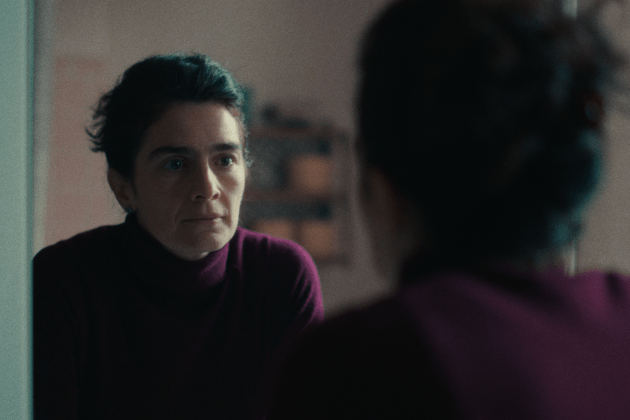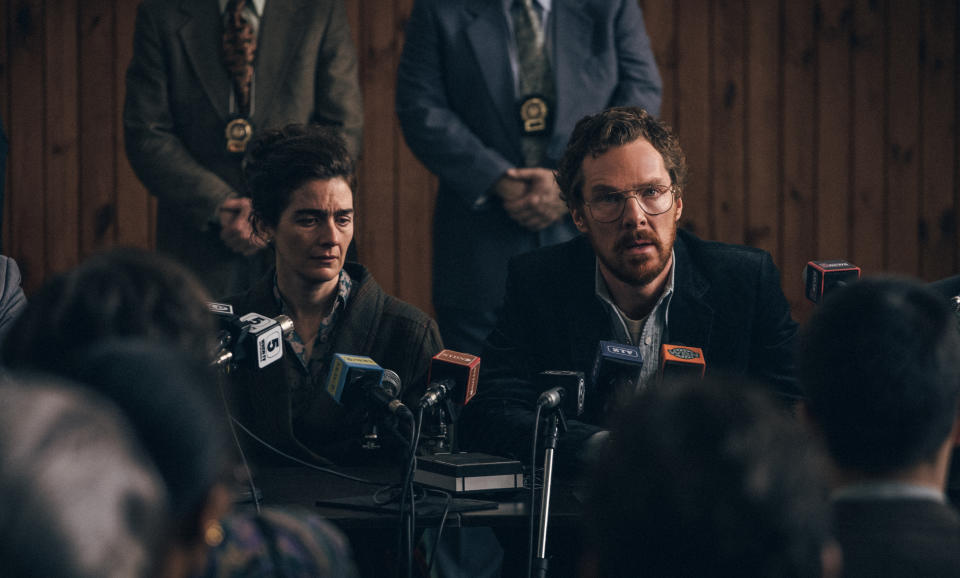‘Eric’ Star Gaby Hoffmann On Working Opposite Benedict Cumberbatch And An Oversized Blue Puppet For Netflix: “It Was Really A Fairy Tale”

In Netflix’s limited series Eric, Gaby Hoffmann and her husband Vincent (Benedict Cumberbatch) are the parents of a clever boy who goes missing on the mean streets of ’80s New York City. Desperate to find their only child, Vincent — a TV puppeteer by trade — recreates a life-size blue monster that he discovers in his son’s drawings, hoping that it will lure the boy home.
Here, Hoffmann — a three-time Emmy nominee best known for her work in Transparent and Winning Time: The Rise of the Lakers Dynasty — talks about her initial hesitation to starring in what looked like a “dead kid” story, and how she felt about acting in the vicinity of a veritable Muppet.
More from Deadline
DEADLINE: I’m surprised at how many people have Googled whether Eric is a true story. What do you make of that?
GABY HOFFMANN: Oh God, I didn’t know that was happening. I have no idea. Maybe because of the specificity of the era and the place, and I guess the loose connection to Etan Patz, the little boy who went missing in downtown New York in the late seventies.
DEADLINE: What was your initial reaction to this role?
HOFFMANN: I was actually a little bit hesitant when I started reading it. My first thought was like, I can’t make a story about a dead kid, not at this moment in my life. I have two young children, and 99% of my time is devoted to being a parent to them. It was kind of an immediate, almost anxious reaction. Like my heart just sort of closed and thought, ‘oh no, I can’t be a grieving mother for five months.’ But as I kept reading and realized that, for one thing, that wasn’t necessarily where it was headed. But also, it was really a fairy tale that we were telling about what happens when we fail to take care of each other and our children… when our government at large, and also when family and marriage fail. We all end up lost, figuratively and literally. When I realized that it was a fairy tale that was taking us deep into the darkness, almost like Demeter having to go underground to rescue Persephone and emerging back out into the light. It’s demanding that we do that hard work, each of us individually, but also collectively facing our darkness and demons and dysfunctions and gross disappointments in order to be able to take care of our children and thus our society. I thought, oh, this isn’t just a sad, hard, scary thriller about a dead kid. This is a call to arms for our children.
DEADLINE: When you saw in the script that there would be this big Muppet thing, did you have a conversation like, ‘okay, how is this going to work?‘
HOFFMANN: Once Eric emerged in the script, I was like, ‘okay, I’m in.’ I don’t watch a lot of television actually, since having kids. I don’t watch much of anything. But it certainly seems like one of the benefits of long-form storytelling is that we really get a chance to dig into the psyche of not just one, but hopefully more than one character in a way that you just can’t necessarily do in a couple of hours. So the idea that the inner psychological experience that our main character is having gets to be played out in this externalization with the puppet was so exciting. It’s also just visually very compelling. Of course, it offers a lot of humor. It’s playful. It’s something fun. The whole world of the puppets in the show was thrilling to me. So I thought it was great.
DEADLINE: Why do you think it was important to have Eric take place in the eighties? How did that serve the story?
HOFFMANN: By the time the story starts, we’ve lived through the sixties and the seventies. So the death of Martin Luther King, Jr. JFK, Malcolm X, the dreams of a peaceful and beautiful and loving and functioning society had died. The eighties was a time of greed and power and corporate capitalism and the capture and robbery of our institutions. We’re sowing those oats today still, right? The eighties was the beginning of this era that we are seeing being played out now, and it’s desperate. It’s not about brotherly love, it’s about getting what you can for yourself. It’s about the letting go of ideals and dreams and the promise of America, and the embrace of individualism and greed, which leads to corruption. And those things corrupt at every level, not just in the case of the police department and so on and so forth, but city hall, and the family. And then of course, there was the AIDS epidemic. It was quite a rich decade, and New York City had such a pathos. It was just at the turning point. It was coming out of the gritty seventies, before every single corner was littered with a Starbucks and Chase bank. The city is in this transitional moment, and you can really feel that people are on the edge. People are desperate.
DEADLINE: Could you explain where we first meet your character, Cassie?
HOFFMANN: She is in a state of paralysis and denial. I think she knows deep down that she needs to leave this marriage, if not for herself, then certainly for her son and also for Vincent, who’s the love of her life. He clearly needs help, and she is legitimizing his behavior by staying with him and keeping them all sort of trapped in this prison of trauma and destruction. He’s not going to do it. She’s the only one who can really break that down, and she’s terrified, too. So I think that the disappearance of Edgar, that crisis precipitates great change for everybody, and often we need a crisis to make a leap. And so as terrifying as it is, she is forced because she is on her own, because Vincent isn’t capable of being her partner. She’s forced to confront this crisis by herself. And in doing so, she finds the strength that was always there, but that she couldn’t access to leave the marriage and confront the truth of the situation.
DEADLINE: There’s never really a name put to whatever mental illness Vincent is facing, or is it just the alcohol talking?
HOFFMANN: Yeah, I don’t think it’s just the alcohol. It’s alluded to that he’s struggled also as a kid. I think it certainly reads as mental illness, but through Eric more specifically, we get the externalization of the inner struggle that on some level we are all in, and as a society we are in. So it’s a dark night of the soul journey. It’s really facing the demons. I see Vincent as the product of an improperly parented child. Sure, it’s behaving as mental illness, but I actually think it’s the consequence. It’s the totally valid consequence of not having been loved as a child. Literally in that scene in the subway tunnels where he’s shadow boxing with Eric, he is in a shadow box with himself, with his Jungian shadow self, who also represents a hero of sorts that he can’t access. He emerges at a place where I think he is at the beginning of being able to lead a healthy realized life as a fully realized person.
DEADLINE: So what was it like on set? Did you become a Cumberbitch?
HOFFMANN: What’s that?
DEADLINE: Female fans of Benedict Cumberbatch are called Cumberbitches.
HOFFMANN: Oh, that is disgusting. I had no idea. I don’t exist online. I don’t have social media, and I avoid the internet at all costs. So I don’t know much about what’s going on in the world. I’m floored.

DEADLINE: What was Benedict like as a scene partner?
HOFFMANN: It was a lot of fun figuring out those scenes with Benedict. I was of course very pleased and delighted to find out that Benedict was like me, just excited to dive in and try and fail and fall and get up and try again and ask questions and just pursue a real authentic experience. I mean, we joked a lot doing press. It was immediately there. It was very easy to start fighting with each other. That part was no problem. I was like, yes, I’m definitely screaming at you.
DEADLINE: If you had to spend a day playing one of your old roles, who would you choose?
HOFFMANN: Crystal Fairy [from the 2013 film Crystal Fairy & The Magical Cactus]. She was so much fun.
DEADLINE: I personally don’t feel like you’re celebrated enough for starring in the best action movie of all time, Volcano. I watched it with my kids multiple times. They loved it.
HOFFMANN: I’m not sure what to say about that.
DEADLINE: There’s been a lot of talk about life as a child actor these days after the Quiet on Set: The Dark Side of Children’s TV came out. Did you have to deal with any creepy bullshit when you were a child actor?
HOFFMANN: Not really, no. I led a very unusual life outside of acting because of who I was raised by and where I was raised. That life was very rich and full and exciting and wonderful. And when I wasn’t on a movie set, I was right back in that life. I didn’t have child actor friends. We didn’t live in LA until I was older. And so it was really just movie sets. And then my other life and the movie sets were all great fun with really wonderful people, really. So no, I didn’t have any creepy stuff and my mom wasn’t a stage mom, so I wasn’t going to premieres. I didn’t even go to a lot of auditions.
Best of Deadline
Hollywood & Media Deaths In 2024: Photo Gallery & Obituaries
2024-25 Awards Season Calendar - Dates For Oscars, Tonys, Grammys, Guilds, BAFTAs, Spirits & More
'Knives Out 3': Everything We Know About The Second Rian Johnson Sequel
Sign up for Deadline's Newsletter. For the latest news, follow us on Facebook, Twitter, and Instagram.
